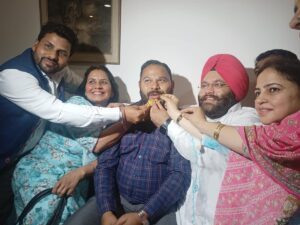The recent Chandigarh mayor election has been anything but ordinary. Marked by allegations of irregularities, legal challenges, and party defections, it has left the city’s political landscape in a state of flux. This article delves into the key events, controversies, and current state of the election, offering insights into the power dynamics.
Initial Standings and Alliances
The Bharatiya Janata Party (BJP) held a clear advantage with 15 votes, including the vote of the Chandigarh MP. The Aam Aadmi Party (AAP) and Congress alliance boasted 20 votes, seemingly securing a comfortable lead. However, with one vote, the Akali Dal remained unaligned, adding an element of uncertainty.
The Controversial Vote and Legal Battle
The election, held on December 8th, 2023, witnessed a dramatic turn when Returning Officer (RO) Yashpal Garg declared BJP candidate Sarabjit Kaur Sonkar victorious with 16 votes. The AAP-Congress alliance secured 12 votes, with eight votes deemed invalid by Garg. This decision sparked outrage, with the opposition alleging unfair invalidation of votes and interference by Garg. Videos showed him seemingly influencing the counting process, further fueling the accusations.
The AAP and Congress challenged the results in the Punjab and Haryana High Court, which ordered a fresh counting under the supervision of a new RO. However, on January 27th, 2024, the Supreme Court upheld the High Court’s decision with a modification, directing the new RO to only consider the validity of the eight disputed votes.
The Power Play: Party Defections and Shifting Loyalties
The Supreme Court’s verdict further complicated the situation. Since the fresh counting wouldn’t involve a complete re-election, the validity of the eight votes held immense significance. In a surprising move, three AAP councillors switched sides, joining the BJP, bringing their vote count to 17. This shift left the AAP-Congress alliance with 12 votes, narrowing their path to victory.
Current Status and Future Outlook
The fresh counting of the eight disputed votes is yet to be scheduled. The outcome remains unpredictable, with the BJP holding a one-vote lead and the Akali Dal’s stance unclear. The AAP and Congress continue to challenge the validity of the defections, adding another layer of uncertainty.
The Chandigarh Mayor election has highlighted the complexities of Indian politics, where alliances can shift, legal challenges can play a crucial role, and individual decisions can significantly impact the outcome. The city waits with bated breath to see how the drama unfolds and who ultimately emerges victorious.
Conclusion
The Chandigarh mayor election serves as a reminder that the path to power is often paved with unforeseen twists and turns. While the legal battle and political maneuvering continue, the residents of Chandigarh hope for a transparent and fair resolution that upholds democratic principles and ensures the city is led by a representative who prioritizes their needs and well-being.
Note: This article is based on publicly available information and does not endorse any political party or candidate. It aims to provide a neutral and objective overview of the events surrounding the Chandigarh mayor election.


